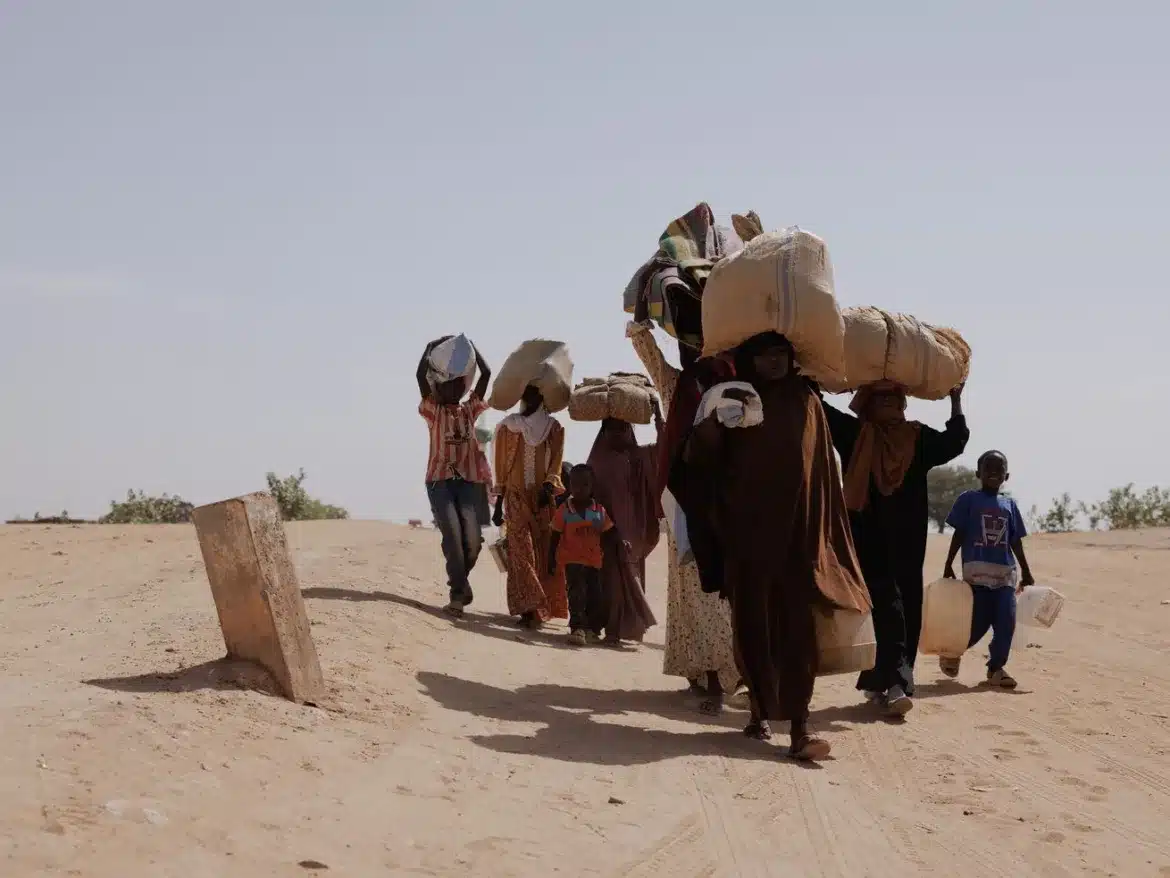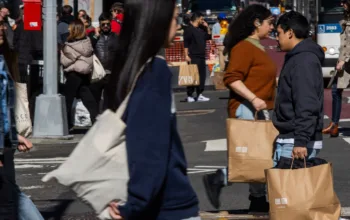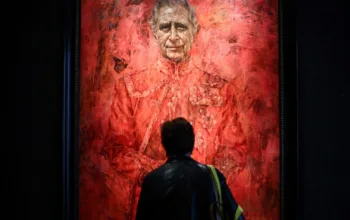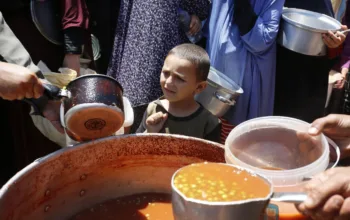International impunity helped allow a power struggle in Sudan to spiral into ethnic violence.
Twenty years ago, American celebrities like George Clooney and Ryan Gosling urged us all to “Save Darfur” from the brutal conflict and ethnic cleansing campaign occurring under Sudanese leader Omar al-Bashir.
Bashir is now gone, but the militias he empowered have been carrying out brutal ethnic cleansings yet again in at least some parts of Darfur, according to a report released Wednesday from Human Rights Watch.
The report details horrific, ethnically targeted crimes like the killing of men and boys from ethnic Massalit and other non-Arab tribes in West Darfur, as well as rape, other forms of sexual violence, torture, other war crimes, and crimes against humanity. The Massalit and other ethnic groups in the Darfur region endured similar agonies in the early 2000s, when a group of militias known as the Janjaweed — which have now evolved into a powerful paramilitary force called the Rapid Support Forces (RSF) — crushed uprisings in the region.
Today, the RSF and the Sudanese Armed Forces (SAF) are locked in a ferocious, deadly power struggle that began last April, quashing the country’s long struggle to transition to democracy. Since the war broke out, 8.7 million people have been displaced, the risk of famine is imminent, and thousands have been killed, with no end in sight as much of the globe turns toward Israel’s war in Gaza.
It’s a tragedy that directly stems from the lack of accountability militias faced in the early 2000s. As both sides of the struggle continue to operate with impunity, the risk of future crimes only increases.
Why ethnic cleansing is occurring in Darfur 20 years later
One year ago, the RSF and the more traditional Sudanese Armed Forces broke out into war. To be clear, this is not ideological; at the baseline, it was two different factions of the military feuding over which one got to be in charge.
But they’ve pulled the entire country into terror with them as they fight for dominance.
Ravina Shamdasani, a spokesperson for the UN High Commissioner for Human Rights, warned last year that the nationwide conflict could stir up old hostilities in the Darfur region. In the early 2000s, violence between ethnic groups there led to the first genocide of the 21st century, one that killed 200,000 people and displaced millions more.
“In El Geneina, West Darfur, deadly ethnic clashes have been reported, with an estimated 96 people killed since 24 April,” she said in late April 2023, calling on all parties “to use every possible means to de-escalate the situation.”
Since then, the violence has only gotten worse, surging in June and November of last year.
Gathering information in the RSF stronghold of Darfur is challenging in part because of internet and social media shutdowns throughout the country, perpetrated by both sides. The details in the HRW report indicate that the RSF and other militias targeted the Massalit ethnic group in West Darfur.
The report focuses on the months between April and November 2023, and only on one area, the city of El Geneina and the suburb Ardamata, which have large Massalit populations, though the RSF has perpetrated crimes in other parts of the region, according to the report. Since 2019, the RSF has engaged in a campaign to marginalize the Massalit there and, along with Arab militias, wrest political power from the group.
To that end, the RSF has targeted community and political leaders, teachers, lawyers, human rights defenders, and religious figures, including allegedly kidnapping and killing the Massalit governor of West Darfur in June of last year. An estimated 10,000 to 15,000 people were killed in El Geneina alone last year, according to an estimate from the UN Panel of Experts on Sudan. The SAF has responded, in part, by restricting humanitarian aid shipments from entering the Darfur region through Chad’s eastern border, citing concerns about weapons entering with them.
Though conflict in the Darfur region is often attributed to ethnic differences, it is just as much a question of political power. The ethnic groups in Darfur involved in the 2003 uprising that precipitated the genocide — the Fur, the Massalit, and Zaghawa — were frustrated with the lack of representation in the national government, pushing them to revolt.
Omar al-Bashir, then Sudan’s authoritarian leader, utilized Janjaweed militias made up of Sudanese Arab fighters, including the forces that would become the RSF, to put down the uprising in the Darfur region. That conflict displaced an estimated 2.5 million people and killed 300,000, according to Reuters.
Though Darfur and other non-urban parts of Sudan continue to be underserved and exploited for natural resources like gold and gum arabic, the RSF isn’t confronting an uprising there.
Rather, the group has essentially brought the war to the country’s westernmost region where it has bases and experience, asserting power there by brutalizing the population. Now, the violent campaign in Darfur is part of the RSF’s effort to gain political power and control for itself, as part of the larger power struggle with the SAF.
Impunity for all actors breeds more violence
After the genocide in Darfur two decades ago, prosecutors with the International Criminal Court subsequently accused Sudanese government officials and Janjaweed leaders of genocide, crimes against humanity, and war crimes in that conflict. But most have so far avoided accountability.
“They have no real reason to believe that they’re ever going to face any consequences for what has happened before, for all the crimes against humanity and war crimes that they’ve committed, because they haven’t been so far,” Hagar Ali, a postdoctoral researcher at the German Institute for Global and Area Studies, told Vox in an interview.
Without accountability for the Darfur genocide and the crimes of the present war, the problems that have led to this point will only recur, allowing violence and ethnic cleansing to occur again.
Power struggles are nothing new in Sudan. Since its independence in 1956, Sudan has undergone the highest number of attempted coups of any African nation. That kind of entrenched instability tends to breed further coups, too.
Though various groups including the RSF and SAF did work together to oust Bashir, the relationship between them has at times been fraught. The integration of the RSF into the SAF was supposed to be a tenet of the democratic transition, but disagreements over power-sharing spiraled into the conflict and atrocities of today.
Now, getting the two leaders of the different factions — General Mohamed Hamdan Dagalo (called Hemedti), head of the RSF, and General Abdel Fattah al-Burhan, who leads the SAF — to agree on an end to the conflict is nearly impossible because, without international pressure, there’s no incentive for them to stop fighting. Neither side has the ability or resources to ensure a decisive victory.
Furthermore, both groups have been woven into the power structure before, making it difficult to dislodge either. The SAF has always been involved in Sudan’s political leadership and likely expects to be in the future, despite the Sudanese people’s desire for a civilian government. The RSF under Hemedti is likely unwilling to be subsumed into the SAF; that proposition sparked the current power struggle.
“There was a courageous nationwide social movement that pushed for a power-sharing arrangement between civilians and the military and security in 2019 and 2020,” Susan Stigant, the Africa director for the US Institute of Peace, told Vox in a March interview. But “the power was never shifted away from the military and the security elites.”
Furthermore, the flow of arms into and out of Sudan — from Russia’s Wagner Group, the UAE, Libya, Niger, and other surrounding African countries — is significantly fueling the fight. But international sanctions systems are not prepared to combat this kind of illicit armed transfers, Ali said, and the different actors involved have no incentive to stop.
If the situation in Sudan seems desperate, that’s because it is. And there’s no clear way to maneuver through it and hold those responsible accountable. But without that accountability, the world is likely to see more — and possibly worse — crimes.



